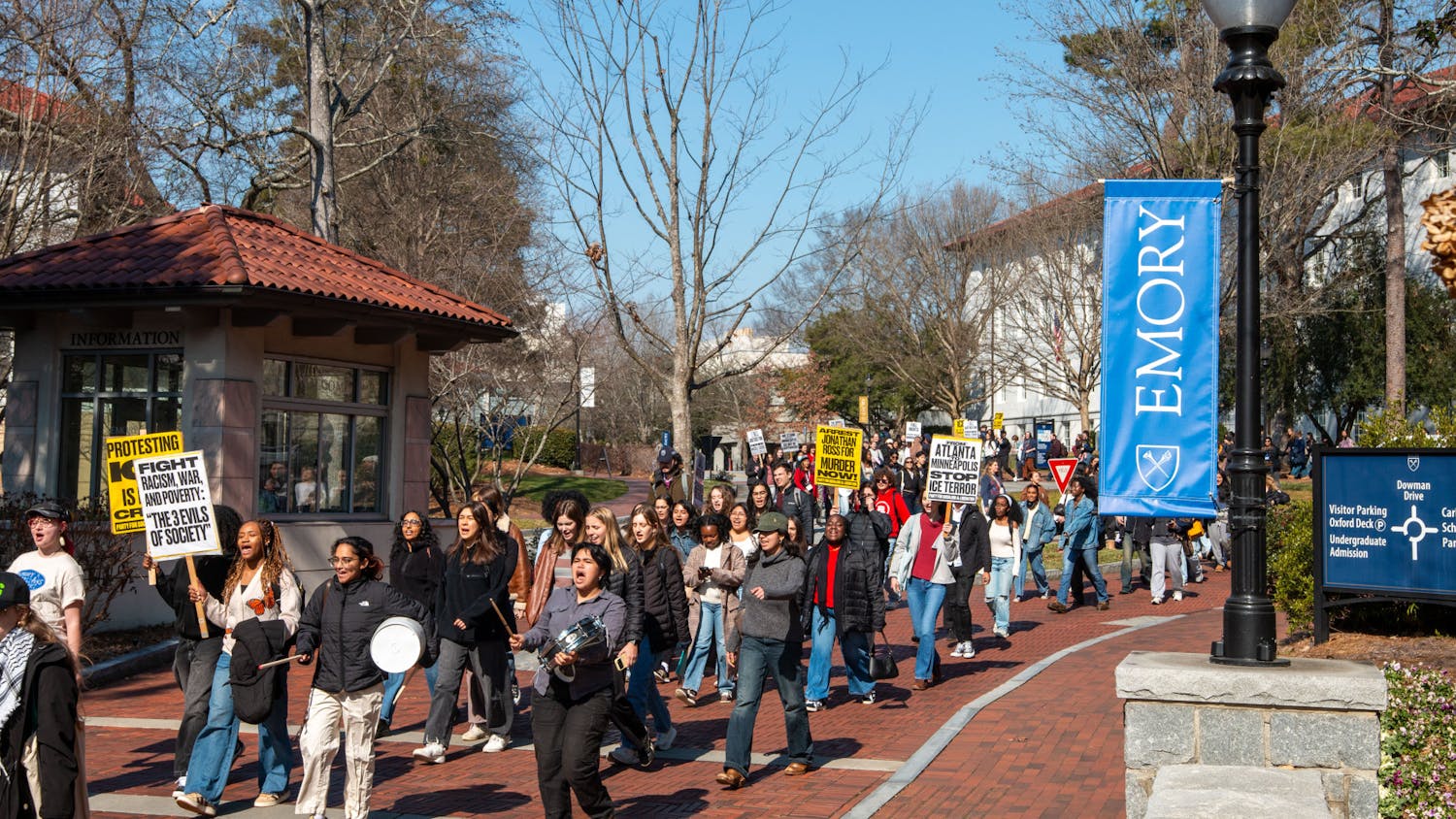
From working up the nerve to talk to your crush to failing to articulate your feelings, we’ve all faced the challenges of pre-adolescence.
“Eighth Grade,” written and directed by comedian Bo Burnham and starring 15-year-old Elsie Fisher, portrays these hallmarks of middle school, among others. The film demonstrates how the internet and social media heighten the stakes of middle school, often complicating the path pre-pubescents must navigate. Protagonist Kayla (Elsie Fisher) copes with the looming transition to high school by posting videos online that share life advice. Through this, she learns what it means to “be herself” and gains confidence.
The Wheel sat down with Burham and Fisher to talk about “Eighth Grade,” set to release July 13.
This transcript has been edited for clarity and length.
Janvi Pamnani, The Emory Wheel: What was it like writing from the mind of a 13-year-old girl?Bo Burnham: I don’t know. At some point, I felt like I just got her. I was very aware of being a man the whole time, and I was looking to the women around me to call bulls**t on me. The movie affords her a certain amount of privacy, [as it’s] not a body-centric movie. It’s more in her head. To be honest, it just made sense to me that I didn’t question it too much. I never presumed her to be any less intelligent than me. I just felt like she had all of my faculty, but she just happened to be a kid that’s a girl in 2018. She has all of my feelings and all of my worries.
TEW: What was the inspiration for this script?
BB: I wanted to write about the internet and how I was feeling. I started writing [down] a bunch of [ideas] and I stumbled upon this voice and found that I could say everything I wanted through her. I wanted to write about this time: eighth grade. I wanted a story that was not nostalgic, and … I wanted it to be visceral and not polluted [by] my own experience. [The protagonist] being a girl prevented me from projecting my own experience on it. Also, if you’re going to write about 13-year-olds and the internet, the girls are five times deeper than the boys at that age. I watched hundreds and hundreds of videos of kids talking online about themselves. The boys talked about Fortnite and the girls talked about their souls ... I don’t even remember what I was thinking in eighth grade. I was a lot dumber and more shallow than [Kayla], for sure.
TEW: You started your career by putting videos online. Did you use your own videos and awkwardness for the film? Elsie, did you watch his videos for inspiration?
BB: I don’t know. (To Fisher) Did you watch my videos?
Elsie Fisher: For sure, I watched [Bo’s] videos for research purposes.
BB: Kayla does something slightly different [from what I did]. I just posted little things I made. She [participates in] this new trend of literally talking about yourself, which was always a really fascinating thing to me. I was a junior in high school [when I started posting videos], so I already had a little bit of a sense of myself. Not that my videos are any less embarrassing.
TEW: What was it like portraying the internet in the film?
BB: One part of it was portraying all the screens practically. We shot all the screens [on real devices]. There’s no screen replacements. We made 200 accounts of kids, so [Elsie] was really scrolling through Instagram and DMing kids because people think that [fake] screens look shitty because they’re in after effects. Actually getting the real screens and the real light bouncing off of it can be really beautiful. It was an absolute nightmare to do, but I think it was worth it. The other aspect of it is digging into [the internet] and trying to show it as a textural part of our life, rather than huge plot points surrounding the internet. Most movies that involve the internet are [about] cyberbullying or your pictures leak and then you go viral. I wasn’t into that at all. I think the way the internet exists in most people’s lives is just a texture, a medium through which they live and not a plot device.
TEW: Elsie, you were in eighth grade pretty recently. How much of your experience and personality did you contribute to Kayla’s character?
EF: Oh, a ton. I think a big part of the movie is about being awkward and anxious about things. That was me in middle school. I remember not having friends. That sounds so depressing, but that played into me being Kayla. The weirdness of the time is very specific, especially growing up around social media.
TEW: Speaking of awkwardness, there are a lot of vocal crutches such as “um” and “like” in Kayla’s speech. How much of that came from Fisher and how much of it came from the script?
EF: Most of it was in the script, I think.
BB: It was written, but it didn’t have to be word perfect. The way it was written gave her permission to be inarticulate. It’s much less improvised than it appears. I always told her that I didn’t say complete sentences until I was 24, so don’t worry about stumbling or stuttering or stammering. That’s sort of the point of all this. It’s about someone failing to articulate themself.
TEW: One of my favorite parts of the movie was Kayla’s relationship with her father, Mark, played by Josh Hamilton. Can you talk a little about creating that relationship?
BB: They rehearsed a lot. They were the only people we rehearsed. [Interacting with] everyone else was a new experience for Kayla, so we wanted [those interactions] to feel new. But with Josh, it had to feel [familiar]. The opening dinner scene has to feel like it’s happened a thousand times, so we [rehearsed] that conversation a thousand times.
EF: It was definitely fun, though. I really like Josh. He is naturally a dad. I mean, in real life he is a dad, but he gives off very “dad” vibes to me. We hung out sometimes off-set, me and Josh and my dad. We went to [the Museum of Modern Art] and we got ice cream.
TEW: Bo, I saw an interview where you said that emotions in movies for middle school-aged audiences are larger than life, since everything feels dramatic when you’re at that age. I thought the use of non-diegetic music in the film really played to that, and was wondering if you could talk about it, especially since you have a musical background.
BB: I wanted an electronic score to make the story big and visceral. You’re totally right about it. It’s exactly for that purpose. I wrote a bunch of temp music for the film [but didn’t think] it was good. I luckily stumbled upon this composer, Anna Meredith. She’s out of London. She’s a Scottish composer. She’s brilliant, and she makes big, theatrical choices with her music. It’s very visceral, but also feels warm and accessible.
EF: She’s amazing. I love her music so much. If the [film’s] soundtrack comes out on iTunes or something, I’m going to buy it.
BB: I think we can hook you up maybe, so you can get it for free.
EF: I will still buy it. She deserves my money.
BB: I don’t know what she would say to that. (laughs) But yeah, you’re totally right about that. We wanted it to be foreground music, not background music.
TEW: How is writing a film script different than writing a stand-up comedy show?
BB: It’s mostly different because, with a comedy show, if you don’t get a laugh every minute you’re bad at your job. With this, you don’t have to do that. You can relax a little bit, and shift tones. The truth is, I’m writing comedy for me to perform [by] myself. When I was writing this, I knew it was a collaboration, so I could be a little braver knowing that the responsibility was spread out a bit more.
'Eighth Grade' Director, Star Discuss Portraying Social Media
Courtesy of Linda Kallerus, A24









